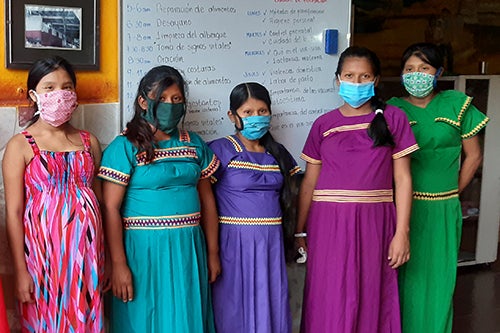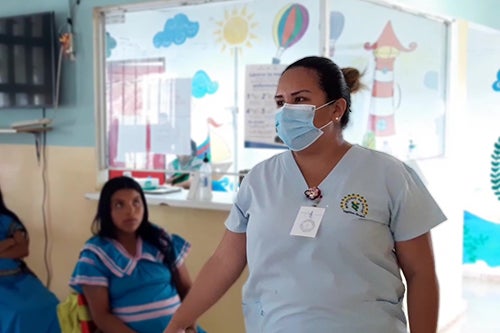Pregnant indigenous women in Panama face COVID-19 fears, lack of transport
June 11, 2020

©UNFPA Panama/Osman Esquivel López
GNÄBE BUGLÉ REGION, Panama – Carmen was two days into an excruciating labour when she was carried to the nearest health clinic – three hours away – in a hammock held aloft by community members.
Her situation was life-threatening, but she had been unable to seek care. Transportation in the area had been suspended due to the COVID-19 pandemic and rains had delayed travel by foot.
“The population is very distant, days away from adequate care. There is no transportation,” said Ángel Rodríguez, a nurse at the Soloy Health Centre. Carmen went to that clinic for care.
In the end, Carmen was lucky. She safely delivered a healthy baby boy.
Reproductive Health in Panama
But her situation is not unique. Many pregnant women have delayed or forgone obstetric care in the Ngäbe Buglé region since the pandemic reached Panama, experts say.

©UNFPA Panama/Osman Esquivel López
The region, largely populated by members of the Ngäbe and Buglé indigenous communities, faces high rates of extreme poverty. Many communities are spread over difficult mountainous and riverine terrain. For many, the only form of transportation is via adapted 4×4 trucks that climb along rural roads. But, even this option has been limited by the pandemic.
For some communities, pregnant women have alarmingly few options when it comes to maternal health services and safe delivery care.
“We tell women to avoid childbirth at home because if there is a complication, they would be far from health facilities,” said Ana De Obaldía, UNFPA worker. “Now, the pandemic has further complicated the transport from their homes to health centres.”
Gains at risk
UNFPA has been working with the Ngäbe Buglé Health Region for 15 years to strengthen sexual and reproductive health in Panama. These efforts include raising awareness about the importance of maternal health and safe childbirth services, and improving the cultural sensitivity of health professionals.
These measures have worked. In recent years, the number of prenatal consultations and institutional deliveries has increased, health officials say.
UNFPA also supports five casa maternas, or maternity waiting homes, in the region. These facilities offer lodging and meals to women near their due date or experiencing high-risk pregnancies. The waiting homes ensure swift access to obstetric care in the case of complications.
But today, the hard-earned gains made by the community and the health system are being threatened.
Coronavirus Cases Increase
By June 9, the Ngäbe Buglé Region reported some 99 COVID-19 cases. Fear of exposure to the virus and transport restrictions have limited women’s use of health services.

©UNFPA Panama/Osman Esquivel López
From January to April, 60 childbirths took place in the Soloy Health Clinic. There were 105 for the same 2019 period. In the Hato Chamí Health Clinic, 50 child births took place, compared to 89 for the same period last year.
A few women are still choosing to stay in the maternity waiting homes. Karina Sánchez says she chose to lodge at the Hato Chamí maternity facility “to be safer and closer to the hospital”.
But the effects of the pandemic have made it harder to serve women who do come for lodging and care. Tomasa González, who works at the facility, says, “They come here expecting to be taken care of, but we don’t have any food for them.”
A staff member at the Soloy Maternity Centre had the same complaint. “There should be enough food available for the pregnant women coming here.”
Neither facility was at full capacity.
Battling pandemic with information
UNFPA continues to work closely with the health ministry to improve sexual and reproductive health in Panama for vulnerable pregnant women. UNFPA is also providing protective gear for health workers.
And health workers are working closely with community members to prevent the spread of COVID-19, as well.
Mariana Marcusi, a community health promoter from the San Félix maternity facility, says it is common to see pregnant women wearing homemade facemasks. Ms. Marcusi encourages them to avoid large gatherings, as well. “I remind them that this is exactly how you can bring the coronavirus into your home.”
– Vannie Arrocha, with reporting from Osman de Esquivel
A version of this story was originally published June 11, 2020 on unfpa.org.